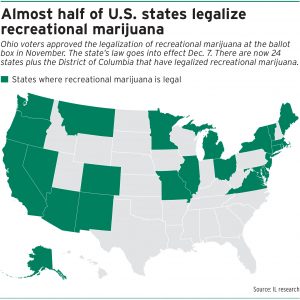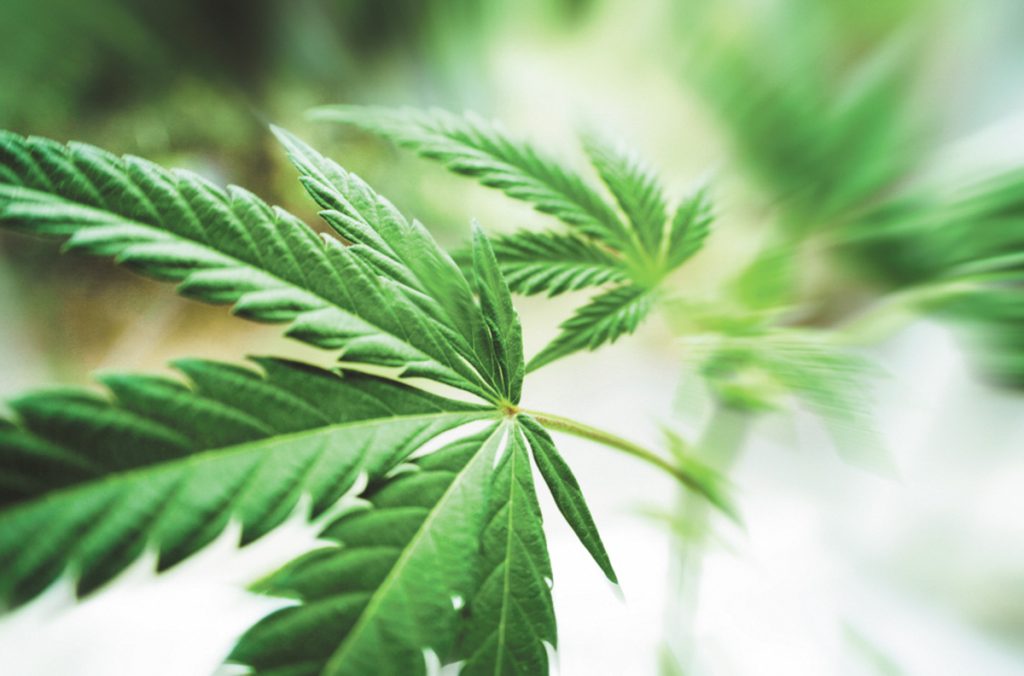Subscriber Benefit
As a subscriber you can listen to articles at work, in the car, or while you work out. Subscribe NowIt hasn’t happened overnight, but Indiana’s neighbors have slowly but surely passed laws legalizing medical and recreational marijuana use for adults.
The most recent legalization came just this month in Ohio, where voters approved recreational marijuana use for adults 21 and older by a comfortable margin. The vote came a week after Indiana lawmakers listened to hours of testimony related to cannabis at an interim study committee meeting.

Senator J.D. Ford, D-Indianapolis, is a member of that study committee on commerce and economic development.
Ford said lawmakers like himself are hearing more and more from constituents about their desire to legalize marijuana use for adults in the state, rather than having to drive to Ohio, Michigan or any neighboring states.
“We continue to be on an island,” Ford said.
Some Indiana legislators have authored bills aimed at decriminalizing marijuana possession or making the drug available for medical, or even recreational, use.
For example, in the 2023 legislative session, House Bill 1297, authored by Rep. Heath VanNatter, R-Kokomo, would have decriminalized possession of two ounces or less of marijuana.
That bill made history by actually getting a legislative hearing.
Most marijuana-related bills in Indiana have not been so fortunate.

Still, Ford said he anticipates there will be some legislation introduced regarding marijuana legalization in 2024.
Sen. Rodney Pol, D-Chesterton, sits on the same interim study committee as Ford.
Pol said it’s become harder for the Legislature to turn a blind eye to potential marijuana-related revenue going to other states.
“I think it’s time in Indiana that we listen to our constituents that are in favor,” Pol said, noting polls that have shown more than 80% of Hoosiers are in favor of some form of legalization.
Pros and cons
The Interim Study Committee on Commerce and Economic Development was tasked with studying “the legalization of adult-use cannabis in Indiana as it relates to workforce impacts and teen use.”
Testimony at the hearing went beyond that narrow scope, with advocates and opponents of marijuana legalization weighing in on topics like the possibility of decriminalizing simple marijuana possession and discussing potential health and economic benefits of THC products. Ford said there were hours of testimony at the Nov. 1 meeting.

Some big players remain opposed to legalization. That includes the Indiana Prosecuting Attorneys Council and the Indiana Chamber of Commerce, which expressed their opposition during the meeting.
According to the Indiana Capital Chronicle, the Indiana Chamber of Commerce — which has long remained opposed to cannabis legalization — said opening up marijuana use will make it harder for Hoosier employers to find workers.
Ashton Eller, vice president of health care policy and employment law, said the chamber opposes marijuana legalization for medical or therapeutic use “until the time when its efficacy and safety have been proven to be consistent through clinical trials,” the Capital Chronicle reported.
And Brock Patterson with IPAC said that black market sales do not disappear after legalization, and that it’s difficult to ensure growers and sellers adhere to licensing requirements in regulated cannabis markets, according to the report.

Patterson also reiterated that in states where adults can use marijuana, “children gain access to the drug, too,” according to the Capital Chronicle.
Groups including the National Organization for The Reform of Marijuana Laws’ Indiana chapter testified in favor of legalization.
Alicia Dougherty, Indiana NORML’s chairperson, noted testimony at the hearing that there is a dispensary in Michigan near Indiana’s border that brings in an estimated $1 million in annual revenue from Hoosiers going across state lines to purchase legalized marijuana.
Justin Swanson, a partner with Bose McKinney & Evans LLP and chair of the firm’s Cannabis group, also testified at the hearing.
Swanson noted Indiana has had a cannabis market since 2018, when Gov. Eric Holcomb signed Senate Enrolled Act 52, which authorized the production of CBD from in-state industrial hemp cultivators.

After the hours of testimony, the interim study committee did not make recommendations related to hemp products, despite some lawmakers asking it to do so.
“I don’t think a lack of a recommendation is going to stop proposed legislation,” Swanson said.
Still, he said passing legislation on cannabis reform will continue to be an uphill battle in Indiana.
National trend
In Ohio, passage of Issue 2 earlier this month makes it the 24th state to allow adult cannabis use for nonmedical purposes. About 56% of voters supported the measure, according to The Associated Press.
The new law will allow adults 21 and over to buy and possess up to 2.5 ounces of cannabis and to grow plants at home. A 10% tax will be imposed on purchases and will be spent on administrative costs, addiction treatment, municipalities with dispensaries, and social equity and jobs programs supporting the industry itself.
Ohio is now the fourth-largest state with a recreational marijuana market, with sales predicted to reach $4 billion by the fourth year after its launch.
It took a ballot initiative in Ohio to legalize recreational use.
In Indiana, Ford said the state doesn’t have a viable mechanism right now to get marijuana legalization on the ballot, noting the state’s Republican supermajority.
That said, the Indianapolis legislator is emphatic that if Indiana is serious about making sure marijuana doesn’t fall into the hands of children, then the state should legalize and regulate it.
Swanson noted that the federal government is waiting on the Drug Enforcement Administration to possibly reschedule marijuana on the federal level.
The U.S. Department of Health and Human Services delivered a recommendation in August to the DEA, recommending that marijuana be moved from a Schedule I to a Schedule III controlled substance, according to the AP. Marijuana is currently classified as a Schedule I drug, alongside heroin and LSD.
Rescheduling the drug would reduce or potentially eliminate criminal penalties for possession.
Time is of the essence if Indiana is going to reap the benefits of legalizing marijuana, Pol said.
He said it makes no sense to wait on the federal government to reschedule marijuana or decriminalize it. If Indiana waits too long and the federal government decriminalizes the drug, then he said there will be no incentive for companies to build dispensaries or grow facilities in Indiana if it it’s no longer illegal to transport the drug across state lines.
Proposed legislation coming in 2024?
Hoosier lawmakers from both parties filed a total of 13 cannabis-related bills in the Indiana General Assembly for the 2023 legislative session, more than in any previous year, according to Indianapolis Business Journal.
But with 2024 being a short legislative session, Ford said he doesn’t know if there will be enough time for the Legislature to pass a marijuana legalization bill, whether it be for medical or recreational use.

Keith Johnson, Indiana NORML’s communications director, said he expects at least a couple of marijuana-related bills to be introduced in 2024.
“At a minimum, I want to see decriminalization happen,” he said.
Johnson also said he thinks it will likely be at least 1½ years before medical marijuana-related legislation might get passed in Indiana. And then there would need to be a regulatory body set up and a structure on how to license dispensaries.
“So there’s a lot of things they haven’t even begun to explore,” he said.
But Johnson said he also feels like there’s been a shift in the past year on legislators’ attitudes toward legalizing marijuana.
To Ford, legalizing marijuana use follows the same principle as legalizing alcohol or tobacco. He said he continues to hear from Hoosiers who want some sort of reform.
Pol said he thinks there will definitely be recreational and medical marijuana bills filed in the 2024 session — in fact, he may file one of his own.
But how far will marijuana-related legislation go in the 2024 session?
“I have to hold out hope that there’s a 50-50 chance that a bill works its way through committee,” Pol said.•
Please enable JavaScript to view this content.

